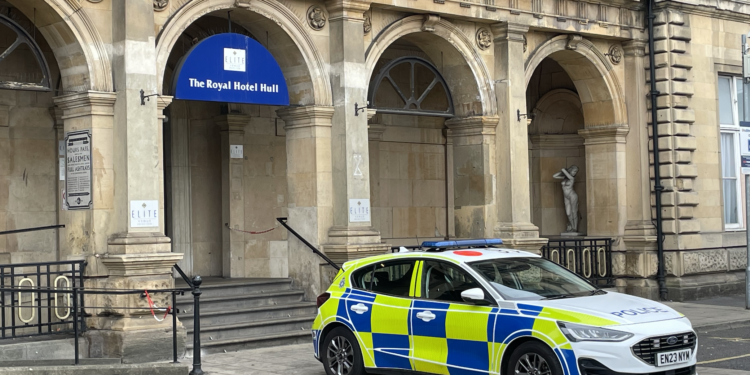When I returned from Hong Kong on Saturday, there was a larger than normal police presence at Hull railway station, of the kind normally seen when visiting football supporters come to see their team play Hull City. It transpired that riots were expected as hundreds of protesters were congregating in the city centre for a protest related to the stabbings in Southport. One of the local Islamic centres near the city centre was surrounded by local Muslim men, presumably in anticipation of trouble.
Soon after my return at midday, the station was closed, bus services through the city centre were cancelled, and the trouble began. Protesters clashed with riot police outside the Royal Hotel, which adjoins the railway station. Bottles were thrown at and injured police, windows were smashed at the front of the hotel and a shoe shop was burnt out. According to one unconfirmed report, the scented soap outlet Lush was raided, presumably by opportunists who like bath bombs, while the Humberside Police were otherwise engaged. Bins were set alight and a flaming barrier was erected on a main road out of the centre. After 20 arrests the trouble subsided but police remained in the city centre overnight.
I went downtown at 6:30am on Sunday to see what evidence there was of the day’s events. Very little in fact. The road where the barrier had been erected was scorched and cordoned off and other bins had evidently been set on fire. About half of the windows on the ground floor of the Royal Hotel were boarded up and on the pavement outside the hotel you could see broken glass. The police were dealing with some troublemakers outside the station entrance but, while the altercation was between white men and a few men of colour, it was probably related, not to the protests, but to alcohol as the local night clubs emptied.
But why Hull and why the Royal Hotel? The Royal Hotel, once described as a “first class hotel” by Travel Weekly, has changed hands several times in recent decades, each change of hands finding it under the management of progressively less prestigious owners including Mercure and lately Britannia Hotels. Once a fine example of a former British Rail hotel which was used, for example, by the university to house prestigious visitors and was a busy conference centre, the hotel has since plunged downmarket and is no longer a sought-after venue for events or accommodation.
The most recent owners, therefore, must have been delighted to have been approached by Mears Group, a housing and social care provider which is contracted to the Home Office to provide accommodation for asylum seekers. Initially only a few asylum seekers were housed there (even local MPs have difficulty establishing precise numbers), but the number has increased to the point where the hotel is no longer accessible to the public. The attractive art deco entrance from the station has been locked for months. Being one of two Hull hotels housing asylum seekers, the issue has united local MPs David Davis (Conservative) and Dame Diana Johnson (Labour) both of whom have raised concerns in Parliament.
Hull has a long history of accommodating asylum seekers which extends through both World Wars to the Hugenots who were expelled from Catholic France in the 16th through to 18th Centuries. More recently, and before the most recent and voluminous waves of asylum seekers arriving in the U.K., a single house in a fairly prestigious neighbourhood was used to accommodate a handful of asylum seekers.
However, in the past decade the face of Hull has changed noticeably. Two main shopping streets with small businesses are now almost completely in the hands of Muslim shopkeepers and restaurant owners. The streets are now ostensibly Muslim areas with large groups of young men hanging about at the entrances to businesses. There is little, if any trouble, but some locals feel increasingly uneasy and are vocal about their concerns, if not in public, most certainly in the pub.
The above immigrants to Hull are largely former asylum seekers granted leave to live in the U.K. and Hull continues to pride itself on being friendly to asylum seekers. But placing hundreds of young, mainly Muslim, men in the heart of the city has tested Hull’s resolve. People in the city centre feel particularly galled by the fact that, while those in the more middle-class parts of Hull such as Cottingham, will wax lyrical about the need to house asylum seekers, their enthusiasm wanes at the thought of having them in their midst. Protesters brought Cottingham to a standstill when it was proposed by the University of Hull (not located in Cottingham) to sell its halls of residence in the leafy suburb to the Home Office to house hundreds of asylum seekers. The university relented and shelved the plans.
Those in the centre of Hull who complain about the influx of asylum seekers, but feel powerless to change things, consider that a double standard exists regarding the housing of asylum seekers depending on your social status. Nevertheless, there have never been riots in Hull before and there is no doubt that there was an influx of protesters this weekend determined to show their displeasure and stir some of the locals into action of the most violent and destructive type. The fact that the murders in Southport had nothing to do with an asylum seeker seems not to have registered.
I share concerns about the influx of asylum seekers to Hull and the changing face of many parts of our small city. But we do not want riots here and we do not want outsiders with malicious intent attacking police, property or asylum seekers.
Dr. Roger Watson is Academic Dean of Nursing at Southwest Medical University, China. He has a PhD in biochemistry. He writes in a personal capacity.












To join in with the discussion please make a donation to The Daily Sceptic.
Profanity and abuse will be removed and may lead to a permanent ban.